The Balearic Islands’ government is currently attempting to prevent fraud in the tourism sector with regards to unregistered holiday rental properties. These unregistered properties are involved in tax evasion - specifically, evading the payment of the ecotax and tourism tax.
The Tax Agency, along with the Balearic government announced that they will take action against individuals committing tax fraud. The ecotax and the tourism tax are mandatory, even if you avoid registering your rental property on the Balearic Holiday Rental Register.

How can a holiday rental property be unregistered but still legal?
Some homeowners are taking advantage of the Urban Rental Law (LAU in Spanish) by advertising their properties through "non-touristic" channels in an attempt to avoid paying taxes (eco and tourism tax) when they cannot meet the holiday rental law requirements.
Owners advertising their properties as short-term lets using Article 13 from the LAU are using this loophole to avoid registering their properties on the Holiday Rental Register. The government believes there are up to 125,000 unregistered properties currently being used for holiday rentals.
This is due to property owners attempting to avoid paying tax on their rental income by taking advantage of legal "grey areas", such as advertising their properties through non-touristic related channels or not offering “tourism-related services” such as extra beds, linen and towels, cleaning services, wifi and cable TV.
The government has stated that it intends to ensure everyone - both hoteliers and rental property owners alike - meet their requirements with regards to taxes. In December 2016 the Spanish Tax Agency announced that they will increase their efforts by conducting more inspections in 2017.
As we explained in previous RentalBuzz articles, the holiday rental law on the Balearic Islands is one of the most strict in Spain.
